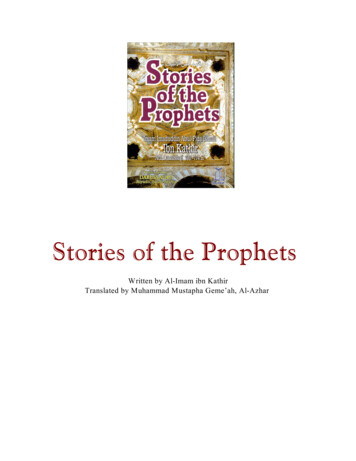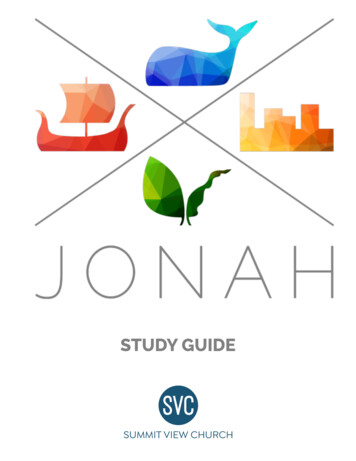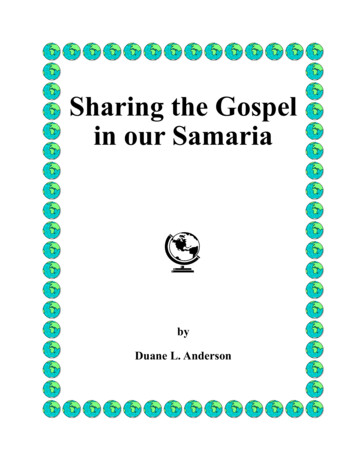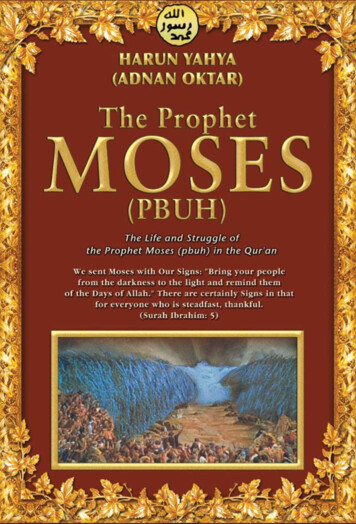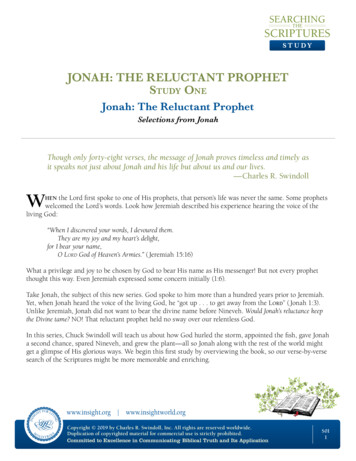
Transcription
ST U DYJONAH: THE RELUCTANT PROPHETStudy OneJonah: The Reluctant ProphetSelections from JonahThough only forty-eight verses, the message of Jonah proves timeless and timely asit speaks not just about Jonah and his life but about us and our lives.—Charles R. SwindollWthe Lord first spoke to one of His prophets, that person’s life was never the same. Some prophetswelcomed the Lord’s words. Look how Jeremiah described his experience hearing the voice of theliving God:hen“When I discovered your words, I devoured them.They are my joy and my heart’s delight,for I bear your name,O Lord God of Heaven’s Armies.” ( Jeremiah 15:16)What a privilege and joy to be chosen by God to bear His name as His messenger! But not every prophetthought this way. Even Jeremiah expressed some concern initially (1:6).Take Jonah, the subject of this new series. God spoke to him more than a hundred years prior to Jeremiah.Yet, when Jonah heard the voice of the living God, he “got up . . . to get away from the Lord” ( Jonah 1:3).Unlike Jeremiah, Jonah did not want to bear the divine name before Nineveh. Would Jonah’s reluctance keepthe Divine tame? NO! That reluctant prophet held no sway over our relentless God.In this series, Chuck Swindoll will teach us about how God hurled the storm, appointed the fish, gave Jonaha second chance, spared Nineveh, and grew the plant—all so Jonah along with the rest of the world mightget a glimpse of His glorious ways. We begin this first study by overviewing the book, so our verse-by-versesearch of the Scriptures might be more memorable and enriching.www.insight.org www.insightworld.orgCopyright 2019 by Charles R. Swindoll, Inc. All rights are reserved worldwide.Duplication of copyrighted material for commercial use is strictly prohibited.Committed to Excellence in Communicating Biblical Truth and Its ApplicationS011
JONAH: THE RELUCTANT PROPHETStudy OneJonah: The Reluctant ProphetST U DYSelections from JonahPREPARE YOUR HEARTFirst, pause. Simply quiet your heart, and express gratitude to God for His Word, asking that He guide youin this study and bless you through this series. Pray the words below as you posture yourself before theAlmighty.Father, what gratitude I have for the ability to discover Your Word and devour it. It is true food for my soul thatalways fills me, guides me, comforts me, corrects me, and delights me. In Your Word I hope. I pray that You make thisstudy of Jonah meaningful to me. I want to grow in Jesus Christ, so I ask that You use this book to increase my spiritual maturity and awareness of Your divine hand upon this earth. For Christ’s glory I pray, amen.YOUR TURN IN THE SCRIPTURESIn these studies, we use Chuck’s Searching the Scriptures Bible study method so we can rightly understandand apply God’s Word. This method incorporates four steps to help us create our own spiritual meals.1. Observation: We read what the text says, perceiving how each word fits in sentences, how each sentence fits in paragraphs, and how each paragraph fits in the book.2. Interpretation: We understand what the text means, delving into word studies, ancient culture, history, and theology.3. Correlation: We compare the passage with other biblical passages that address similar topics whetherthey be historical, theological, or applicational.4. Application: We integrate into our lives biblical truths and principles, obeying Jesus’ commands,believing Jesus’ promises, and walking with Jesus always.Since we’re at the beginning of a series, it’s a good time to add to your library of Bible study resources.Chuck recommends you add one per month. Below, we’ve provided a few to consider if you don’t alreadyhave them.1. Bible Dictionary: This invaluable tool compiles hundreds—if not thousands—of articles explainingwhat you find in the Bible. Chuck prefers The New Unger’s Bible Dictionary.Copyright 2019 by Charles R. Swindoll, Inc. All rights are reserved worldwide.Duplication of copyrighted material for commercial use is strictly prohibited.Committed to Excellence in Communicating Biblical Truth and Its ApplicationS012
JONAH: THE RELUCTANT PROPHETStudy OneJonah: The Reluctant ProphetST U DYSelections from Jonah2. Study Bible: We recommend The Swindoll Study Bible. If you already have it, Chuck also likes the NewLiving Translation Life Application Study Bible and the New American Standard Ryrie Study Bible. Allof these study Bibles complement each other.3. Commentary: If you don’t have a commentary set, we recommend either The Bible KnowledgeCommentary or The Expositor’s Bible Commentary for a full set. If you want a stand-alone commentaryon Jonah, we recommend The NIV Application Commentary: Jonah, Nahum, Habakkuk, Zephaniah.Before examining each fruit in the spiritual orchard of Jonah, this study puts us on a plane to fly above it. Toaid us, Chuck Swindoll created an overview chart of Jonah. Review that now to get a bird’s eye view of theflow of the story.JONAHRunningfrom GodFirst commissionof JonahResults ofdisobedienceCHAPTER1ThemeKey VersesChrist in JonahRunningto GodPrayerof JonahRunningwith GodSecond commissionof JonahCommunicationwith the LordCHAPTER2Results ofobedienceCHAPTER3Runningagainst GodPrejudiceof JonahLessons fromthe LordCHAPTER4God’s infinite mercy for all people; our reluctance to share His mercy2:9; 4:11Jonah’s three days in the fish anticipates Christ’s death and resurrection.The Ninevites’ salvation represents the salvation available to all people in Christ.Copyright 1980, 1997, 2009, 2019 by Charles R. Swindoll, Inc. All rights reserved worldwide.See something especially insightful? Record that below.Copyright 2019 by Charles R. Swindoll, Inc. All rights are reserved worldwide.Duplication of copyrighted material for commercial use is strictly prohibited.Committed to Excellence in Communicating Biblical Truth and Its ApplicationS013
JONAH: THE RELUCTANT PROPHETStudy OneJonah: The Reluctant ProphetST U DYSelections from JonahObservationFor observation, we’ll simply read through Jonah and answer four basic questions summarizing each chapter. Consider doing so with multiple translations, such as the New Living Translation and the New AmericanStandard Bible.In chapter one, how did Jonah run from God?In chapter two, how did Jonah run to God?In chapter three, how did Jonah run with God?In chapter four, how did Jonah run against God?Copyright 2019 by Charles R. Swindoll, Inc. All rights are reserved worldwide.Duplication of copyrighted material for commercial use is strictly prohibited.Committed to Excellence in Communicating Biblical Truth and Its ApplicationS014
JONAH: THE RELUCTANT PROPHETStudy OneJonah: The Reluctant ProphetST U DYSelections from JonahIf you’re trying to run from God, don’t waste your time. You’ll find He’ll be there waiting for you. ButJonah, of course, is caught up in himself. —Chuck SwindollInterpretationIn the Old Testament, the book of Jonah is classified as prophesy. What was the role of an Israelite prophet?How did God use prophets? Answer these questions by looking up prophet and prophecy in your Bible dictionary. Summarize your research below.Next, read an overview of the book of Jonah. You can consult Insight for Living Ministries’ overview as wellas your dictionary’s entry for Jonah. Note the time period in which the prophet lived and the message thebook contributes to the biblical account of God’s divine saga.Copyright 2019 by Charles R. Swindoll, Inc. All rights are reserved worldwide.Duplication of copyrighted material for commercial use is strictly prohibited.Committed to Excellence in Communicating Biblical Truth and Its ApplicationS015
JONAH: THE RELUCTANT PROPHETStudy OneJonah: The Reluctant ProphetST U DYSelections from JonahCorrelationJeremiah loved hearing from God. Jonah dreaded it . . . until a fish swallowed him. We have such a privilege, by God’s grace, to be able to study His Word. So for correlation, we’ll read a paragraph penned by theapostle Peter near the end of his life.Read 2 Peter 1:12–21. How did Peter describe the nature of God’s Word? How does God’s Word benefit uswhen we pay close attention to it?Anticipating JesusIn Chuck’s book Searching the Scriptures: Find the Nourishment Your Soul Needs, he writes, “The Bible is dividedinto two major sections: the Old Testament, which anticipates the coming of Jesus, the Messiah; and theNew Testament, which presents Jesus as the Messiah and explains His ministry and purpose.” 1 So as westudy Jonah, we will take time to consider ways this Old Testament book anticipates the person and work ofJesus Christ.ApplicationChuck provided four principles to consider as we embark on this study of Jonah.1. From Jonah 1: Running from God is a theological impossibility.2. From Jonah 2: Running to God is a personal necessity.3. From Jonah 3: Running with God is a remarkable discovery.4. From Jonah 4: Running against God is a pitiful catastrophe.Copyright 2019 by Charles R. Swindoll, Inc. All rights are reserved worldwide.Duplication of copyrighted material for commercial use is strictly prohibited.Committed to Excellence in Communicating Biblical Truth and Its ApplicationS016
JONAH: THE RELUCTANT PROPHETStudy OneJonah: The Reluctant ProphetST U DYSelections from JonahReflect on your life over the past year and record how these principles have proven true.A FINAL PRAYERConsider your current season of life. How would you like your relationship with Jesus to grow? What wouldyou like Jesus to do for you through this series on Jonah? Express your answers to these questions by writing a prayer below.ENDNOTE1.Charles R. Swindoll, Searching the Scriptures: Find the Nourishment Your Soul Needs (Carol Stream, IL: Tyndale House, 2016), 4.Copyright 2019 by Charles R. Swindoll, Inc. All rights are reserved worldwide.Duplication of copyrighted material for commercial use is strictly prohibited.Committed to Excellence in Communicating Biblical Truth and Its ApplicationS017
ST U DYJONAH: THE RELUCTANT PROPHETStudy TwoResistance of a Racist RebelJonah 1:1–12It’s the grace of God that keeps you alive, the grace of God that’s brought you tothis moment.—Charles R. SwindollEwith small beginnings in Gath-hepher, Jonah developed a reputation for being God’s spokesman.He knew when the Lord of Heaven addressed him. Look at what the author of 2 Kings said:venJeroboam II recovered the territories of Israel between Lebo-hamath and the Dead Sea, just as theLord, the God of Israel, had promised through Jonah son of Amittai, the prophet from Gath-hepher.(2 Kings 14:25)In this series, we will observe a less obedient side of the prophet Jonah. He preached only when the messageand people suited his preference. He even harbored deep-seated hatred against the Ninevites, which drovehim to the port of Joppa where he set sail in the opposite direction of God’s will.However, God used one man’s rebellion as an opportunity to display His own character, now recorded inScripture for all to see. In this study, we will explore with Chuck Swindoll the significance of Jonah 1:1–12to gain a clear understanding of what happens when God’s persistence storms against our prejudices.www.insight.org www.insightworld.orgCopyright 2019 by Charles R. Swindoll, Inc. All rights are reserved worldwide.Duplication of copyrighted material for commercial use is strictly prohibited.Committed to Excellence in Communicating Biblical Truth and Its ApplicationS021
JONAH: THE RELUCTANT PROPHETStudy TwoResistance of a Racist RebelST U DYJonah 1:1–12PREPARE YOUR HEARTBefore we engage with God’s Word, we should pray that God makes it personally meaningful.Be good to your servant,that I may live and obey your word.Open my eyes to seethe wonderful truths in your instructions. (Psalm 119:17–18)Make this prayer your own, expressing your humble request to our Lord.YOUR TURN IN THE SCRIPTURESIn Searching the Scriptures: Find the Nourishment Your Soul Needs, Chuck Swindoll wrote, “It takes some effortto learn how to consistently draw truth from the Bible, but it is well worth the effort. As [you] get into theprocess . . . you will discover how beneficial such study can be.” 1After weeks or even months of study, how rewarding it is to see how Jesus has shaped your thinking,brought you closer to Him, and given you the grace to live by His Spirit rather than your own power.Observation: The Resistance and the StormWhen we observe a passage, we examine:1. The who, what, where, when, why, and how2. What you can see, touch, taste, hear, and smell3. The logical connections, flow of thoughts, and range of subjects4. What’s repeated, emphasized, related, alike, and unalikeCopyright 2019 by Charles R. Swindoll, Inc. All rights are reserved worldwide.Duplication of copyrighted material for commercial use is strictly prohibited.Committed to Excellence in Communicating Biblical Truth and Its ApplicationS022
JONAH: THE RELUCTANT PROPHETStudy TwoResistance of a Racist RebelST U DYJonah 1:1–12Observe Jonah 1:1–12. Take it slow, and record important findings.Bound for TarshishDid you see the repetition? In Jonah 1:3, what did the author mention twice to convey emphasis?How does Jonah 1:4 relate to that emphasis in 1:3?Contrast the sailors’ and Jonah’s responses to the storm.Copyright 2019 by Charles R. Swindoll, Inc. All rights are reserved worldwide.Duplication of copyrighted material for commercial use is strictly prohibited.Committed to Excellence in Communicating Biblical Truth and Its ApplicationS023
JONAH: THE RELUCTANT PROPHETStudy TwoResistance of a Racist RebelST U DYJonah 1:1–12Jonah was a racist rebel. Instead of being wide open and willing to go wherever God told him, he wasa prejudiced, narrow-minded Jewish prophet who wanted nothing to do with those Gentiles living inAssyria. —Chuck SwindollJonah on the Witness StandOften, a biblical author’s use of a repeated word or phrase draws attention to his point. Contrast the captain’s command to Jonah in 1:6 with the Lord’s command to Jonah in 1:2. (Hint: Note the verbs.)How many questions did the sailors ask Jonah in 1:8–11?How did Jonah describe his identity in 1:9, and how did his answer address the sailors’ first set of questions?What three points did Jonah make in 1:12 when he answered the sailors’ second set of questions?Copyright 2019 by Charles R. Swindoll, Inc. All rights are reserved worldwide.Duplication of copyrighted material for commercial use is strictly prohibited.Committed to Excellence in Communicating Biblical Truth and Its ApplicationS024
JONAH: THE RELUCTANT PROPHETStudy TwoResistance of a Racist RebelST U DYJonah 1:1–12The Lord did not throw His hands in the air and give up on this fleeing prophet. God not only wanted theNinevites to hear His warning, He wanted Jonah to announce it.Interpretation: The Lord’s “Hounds of Heaven”During interpretation, we ask: What meaning did the author intend to convey to the original audience? and Whatdoes this passage teach us about God, God’s ways, and God’s world? Don’t forget to consult your study tools andfree online resources like the NET Bible and Constable’s Notes.First use a Bible map to locate Nineveh and Joppa, and use your Bible dictionary to look up the entriesTarshish, Nineveh, and Joppa. How are each of these significant to the story?How did the author contrast the clear-minded, religious nature of the sailors with the stiff-necked, rebelliousnature of Jonah?The Prophet and His GodLook at Jonah’s first response regarding his identity.Jonah answered, “I am a Hebrew, and I worship the Lord, the God of heaven, who made the sea andthe land.” ( Jonah 1:9)Copyright 2019 by Charles R. Swindoll, Inc. All rights are reserved worldwide.Duplication of copyrighted material for commercial use is strictly prohibited.Committed to Excellence in Communicating Biblical Truth and Its ApplicationS025
JONAH: THE RELUCTANT PROPHETStudy TwoResistance of a Racist RebelST U DYJonah 1:1–12Using Jonah’s confession in Jonah 1:9, the author used irony to convey theology. How is God’s sovereigntyportrayed through the irony in 1:9 compared to 1:3 and in 1:9 compared to 1:4?You Can Run, But You Can’t Hide“Throw me into the sea,” Jonah said, “and it will become calm again. I know that this terrible storm isall my fault.” ( Jonah 1:12)How does Jonah 1:12 indicate that Jonah had a moment of clarity after the sailors questioned him? Whattheological significance did his moment of clarity have? What theological significance do moments of clarityhave today?Jonah actually makes a prophecy here. Jonah reassured them after he had admitted his own guilt. Hedidn’t know what the future held, but he knew for them there would be a calm sea and he’d be out ofthe picture, off the ship, in the drink, at the mercy of his God. —Chuck SwindollCorrelation: The Sovereign God of GlorySince we just studied about God’s control of this world, we will make that topic our focus for correlation inthis study.Copyright 2019 by Charles R. Swindoll, Inc. All rights are reserved worldwide.Duplication of copyrighted material for commercial use is strictly prohibited.Committed to Excellence in Communicating Biblical Truth and Its ApplicationS026
JONAH: THE RELUCTANT PROPHETStudy TwoResistance of a Racist RebelST U DYJonah 1:1–12Psalm 89This fifty-two-verse psalm extols God for His power and covenant loyalty to David (Psalm 89:1–37); thenthe author lamented God’s seeming unfaithfulness to His promises (89:38–52).However, the psalmist knew God wasn’t absent. That’s why he could lament to God. God hears us evenwhen He seems distant. Read the psalmist’s confession of God’s power in Psalm 89:8–14. How does this passage convey God’s abiding presence and control over the world?Anticipating JesusA scene like Jonah 1 occurred during the ministry of Jesus. One man slept on a boat with storm-drivenwaves crashing all around causing fear in the other passengers. Look at what happened:Then Jesus got into the boat and started across the lake with his disciples. Suddenly, a fierce stormstruck the lake, with waves breaking into the boat. But Jesus was sleeping. The disciples went andwoke him up, shouting, “Lord, save us! We’re going to drown!” Jesus responded, “Why are you afraid?You have so little faith!” Then he got up and rebuked the wind and waves, and suddenly there was agreat calm. The disciples were amazed. “Who is this man?” they asked. “Even the winds and wavesobey him!” (Matthew 8:23–27)As a matter of fact, that man is the God-man, who “even the winds and waves obey.” Jesus uses the samepower that controls the waves of the sea for the ultimate “good of those who love God and are called according to his purpose” (Romans 8:28)—a lesson in faith that Jonah struggled to grasp.Copyright 2019 by Charles R. Swindoll, Inc. All rights are reserved worldwide.Duplication of copyrighted material for commercial use is strictly prohibited.Committed to Excellence in Communicating Biblical Truth and Its ApplicationS027
JONAH: THE RELUCTANT PROPHETStudy TwoResistance of a Racist RebelST U DYJonah 1:1–12Application: Lasting Truths That MatterNow we will personally integrate, in the Spirit’s power, the truths from our passage of study.Do you find yourself in a storm of suffering and difficulty wondering if God even knows you need help?Take a moment to express your confidence in God’s control and record your lament, like the writer ofPsalm 89, because God hears you.In his sermon, Chuck said, “Grace allows us complete freedom to disobey,” and, “When we disobey, gracedoes not cancel the consequences.” What ways are you tempted to turn away and induce a storm? Confessthat below along with an acknowledgement of your dependence upon Christ to keep you strong in Him.Spiritual clarity not only leads you to repentance, it can also keep you from doing foolish acts that requireyou to repent in the first place. Do you need a moment of clarity?Not until we face and accept reality will grace bring the calm. —Chuck SwindollA FINAL PRAYERFather, You are the God who rides on the storm, who feeds the ravens on the mountains, and who protects newborncubs. Please give me the wisdom that comes from knowing Your power, Your control over this world. In the times I actunwise and turn away, please make me willing to acknowledge more quickly than Jonah whatever is my fault, to turnto You, and to receive forgiveness and restoration that You offer graciously in Jesus Christ. Amen.ENDNOTE1.Charles R. Swindoll, Searching the Scriptures: Find the Nourishment Your Soul Needs (Carol Stream, IL: Tyndale House, 2016), 10.Copyright 2019 by Charles R. Swindoll, Inc. All rights are reserved worldwide.Duplication of copyrighted material for commercial use is strictly prohibited.Committed to Excellence in Communicating Biblical Truth and Its ApplicationS028
ST U DYJONAH: THE RELUCTANT PROPHETStudy ThreePrayers Onboard—Prophet Overboard!Jonah 1:9–17When you read your Bible, never forget about the invisible presence of God.—Charles R. SwindollWor not we believe it, whether or not we see it, everything in the universe from a carbon atomto the Milky Way Galaxy marches in step to God’s command.hetherJonah refused to acknowledge God’s universal sovereignty, so he comforted himself by hopping a shipheaded to Tarshish, assuming he had escaped the presence of the Lord. But he hadn’t. Deep down, heprobably knew it. Once Jonah fell asleep below deck, God sent a violent storm. So, the frightened sailorsawakened Jonah and led him to confess the truth: his God had sent the storm on account of his owndisobedience.Jonah and the mariners came face to face with the power of God. How would each respond? Would theymarch in step to God’s command? In this study, we will examine with Chuck Swindoll Jonah 1:9–17 tounderstand the meaning of the phrase “God knows what He’s about.” We’ll learn with Jonah and the crewhow we should respond when we, in our day, come face to face with that same power.This isn’t ancient theology, for only ancient times. This is for today. This includes the storms in yourlife and those in mine. —Chuck Swindollwww.insight.org www.insightworld.orgCopyright 2019 by Charles R. Swindoll, Inc. All rights are reserved worldwide.Duplication of copyrighted material for commercial use is strictly prohibited.Committed to Excellence in Communicating Biblical Truth and Its ApplicationS031
JONAH: THE RELUCTANT PROPHETStudy ThreePrayers Onboard—Prophet Overboard!ST U DYJonah 1:9–17PREPARE YOUR HEARTBefore we delve into the Word of God, contemplate the prayer below and make it your own as you readyyourself before the Lord.Father, I open myself to You and pray You will not find my mind closed as I sit before Your Word, Yourtruth to live by. These words that have been preserved through the centuries are so precious to us. Giveme faith to see the invisible, to hear the inaudible, and to realize the incredible that is taking place inmy life. In Jesus’ name, amen.YOUR TURN IN THE SCRIPTURESThis study will take us to the most iconic scene in the story of Jonah: a gigantic fish swallowing agrown man.Observation: Storms That Shock UsObserve Jonah 1:9–17. Be sure to jot down what you see. Putting your observations into words on paper clarifies what you identify as significant.Did the sailors immediately obey Jonah’s instructions from 1:12–13?What did the sailors assume and express about God in 1:14?Copyright 2019 by Charles R. Swindoll, Inc. All rights are reserved worldwide.Duplication of copyrighted material for commercial use is strictly prohibited.Committed to Excellence in Communicating Biblical Truth and Its ApplicationS032
JONAH: THE RELUCTANT PROPHETStudy ThreePrayers Onboard—Prophet Overboard!ST U DYJonah 1:9–17How did the sailors respond to the Lord when the storm ceased in Jonah 1:16?What theological significance did the author prescribe to the fish in 1:17?God is high above us. That’s why we hold Him in awe. God prearranges events. That’s why He is anawesome God. He brings the great fish. The fish swallows Jonah, and in fact, rather than punishingJonah, it is a gracious rescue of Jonah. —Chuck SwindollInterpretation: Fears That Bring Us to Our KneesIf you are waiting in line at the movies with a friend and he says, “Hey, my foot!” you easily apprehendthe words he uses. You interpret that his foot hurts because you are standing on it. What’s the message hewants you to grasp? Get off my foot! You know you have interpreted the Bible well when you understand theauthor’s meaning and what he wants you to do with it.Searching the Scriptures Tip: InterpretationAs Jesus is truly divine and truly human, two natures in one person, so is the Bible, twonatures in one book. This means God used the personalities, languages, cultures, andeducation of the biblical authors when He deposited His Word among us. So we should studythe text’s genre and literary devices during interpretation. A genre follows a certain style orpattern of writing while literary devices create special effects for the audience, emphasizingcertain points. The book of Jonah contains two genres: narrative and poetry, and it employsirony as a literary device which serves to contrast expectations and reality.Copyright 2019 by Charles R. Swindoll, Inc. All rights are reserved worldwide.Duplication of copyrighted material for commercial use is strictly prohibited.Committed to Excellence in Communicating Biblical Truth and Its ApplicationS033
JONAH: THE RELUCTANT PROPHETStudy ThreePrayers Onboard—Prophet Overboard!ST U DYJonah 1:9–17Irony One: Hurl / ThrowIn Jonah 1, the author used the Hebrew word tul in four locations to draw an ironic contrast betweenGod, Jonah, and the sailors. It can mean “hurl,” “throw,” or “cast.” King Saul threw [tul] a spear at David(1 Samuel 18:11).But the Lord hurled [tul] a powerful wind over the sea, causing a violent storm that threatened tobreak the ship apart. ( Jonah 1:4, emphasis added)Fearing for their lives, the desperate sailors shouted to their gods for help and threw [tul] the cargooverboard to lighten the ship. But all this time Jonah was sound asleep down in the hold. (1:5,emphasis added)“Throw [tul] me into the sea,” Jonah said, “and it will become calm again. I know that this terriblestorm is all my fault.” (1:12, emphasis added)Then the sailors picked Jonah up and threw [tul] him into the raging sea, and the storm stopped atonce! (1:15, emphasis added)The author could have used alternative words to describe the four actions, but he chose the same in each.Determine what theological emphasis the author’s repetition conveys. Remember to use your Bible studytools.Irony Two: Fear/WorshipIn Jonah 1, the author used the Hebrew root yare six times. It can mean “fear,” “afraid,” “worship,” “honor,”or “revere.”Fearing [yare] for their lives, the desperate sailors shouted to their gods for help and threw the cargooverboard to lighten the ship. But all this time Jonah was sound asleep down in the hold. ( Jonah 1:5,emphasis added)Copyright 2019 by Charles R. Swindoll, Inc. All rights are reserved worldwide.Duplication of copyrighted material for commercial use is strictly prohibited.Committed to Excellence in Communicating Biblical Truth and Its ApplicationS034
JONAH: THE RELUCTANT PROPHETStudy ThreePrayers Onboard—Prophet Overboard!ST U DYJonah 1:9–17Jonah answered, “I am a Hebrew, and I worship [yare] the Lord, the God of heaven, who made thesea and the land.” ( Jonah 1:9, emphasis added)The sailors were terrified [yare] when they heard this, for he had already told them he was runningaway from the Lord. “Oh, why did you do it?” they groaned. (1:10, emphasis added) (The wordyare is mentioned twice for emphasis.)The sailors were awestruck [yare] by the Lord’s great power, and they offered him a sacrifice andvowed to serve him. (1:16, emphasis added) (Yare is mentioned twice for emphasis.)What theological emphasis or emphases did the author communicate through this repetition of yare?Concluding InterpretationIn the last Searching the Scriptures study, we noted God’s control over this world. How did the author furtherdevelop this theme in Jonah 1:13–17?If you’ve been brought to your knees and your limitations have been revealed to you, learn from thesailors. Learn from the sailors that it’s time to be awestruck. —Chuck SwindollCorrelation: “I Want the Wicked to Turn and Live.” —GodGod’s judgment against Jonah prompted the sailors to turn from their false gods. In Jonah 1:16, thePhoenician sailors made a sacrifice in gratitude to Israel’s God and vowed to Him in faith. Repentance—it’swhat God desires of all: “Do you think that I like to see wicked people die? says the Sovereign Lord. Ofcourse not! I want them to turn from their wicked ways and live” (Ezekiel 18:23).Copyright 2019 by Charles R. Swindoll, Inc. All rights are reserved worldwide.Duplication of copyrighted material for commercial use is strictly prohibited.Committed to Excellence in Communicating Biblical Truth and Its ApplicationS035
JONAH: THE RELUCTANT PROPHETStudy ThreePrayers Onboard—Prophet Overboard!ST U DYJonah 1:9–17First Thessalonians 1:2–9Around AD 50, Paul wrote from Corinth to the Thessalonian church. He began his letter with a beautifulimage of the Thessalonians’ repentance. Take a moment to read 1 Thessalonians 1:2–9, noting especially 1:9.How did Paul describe the event and outcome of the Thessalonians’ turn to God?Anticipating JesusIn the next verse, Paul said:And they speak of how you are looking forward to the coming of God’s Son from heaven—Jesus,whom God raised from the dead. He is the one who has rescued us from the terrors of the comingjudgment. (1 Thessalonians 1:10)What the sailor’s experienced in part—the deliverance and mercy of God—Jesus offers in full. Jesusreceived the storm of God’s wrath, which is against all evil, that we might be more than conquerors throughHim because He loves us. Now we await our full deliverance from all the stor
Charles R. Swindoll, Searching the Scriptures: Find the Nourishment Your Soul Needs (Carol Stream, IL: Tyndale House, 2016), 4. JONAH: THE RELUCTANT PROPHET S TUDY O NE




